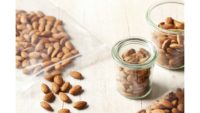allSWEET allulose mitigates impact of table sugar, new study shows
Rare sugar is poised to reshape a food industry grappling with sugar and obesity challenges.

courtesy of: Anderson Advanced Ingredients
Anderson Advanced Ingredients, a provider of innovative food, nutraceutical and beverage ingredients, has announced the publication of a study on allSWEET Allulose, a naturally occurring rare sugar. The study, titled “Comparison of Postprandial Glycemic and Insulinemic Response of Allulose when consumed alone or when added to sucrose: A randomized controlled trial” has been published in the Journal of Functional Foods.
Glycemic response expert Alexandra Jenkins, PhD and her team at INQUIS Clinical Research conducted the study with the objective of comparing the glycemic and insulin response to allulose, a naturally occurring monosaccharide and its potential ability to blunt postprandial glucose when consumed with a carbohydrate-containing meal.
The published results indicate that allulose suppresses glucose and insulin responses on its own and mitigates the response when consumed with sucrose.
“The study adds to a growing body of literature on the dampening effects of allulose consumption on glycemic and insulin responses. The results are impressive because allulose does not appear to behave like non-nutritive or low-calorie sweeteners. It appears to be unique in this respect,” comments allulose expert Nick Bellissimo, PhD, Toronto Metropolitan University associate professor.
He adds, “allSWEET is unique in that it is a naturally occurring rare sugar with the same taste and texture of sucrose but does not affect glycemic response and has a negligible energy content. Given reformulation efforts currently underway to reduce the sugars content of food and beverages, allulose may be well positioned to offer significant functional advantages over other ingredients. While more research is needed, allSWEET does appear to be in a category of its own.”
Anderson Advanced Ingredients was first to market with allulose in 2014, with allSWEET being a pillar in the company’s efforts to lead the sugar reduction movement.
“allSWEET is an essential weapon in our arsenal to fight back against the negative impact of sugar and non-nutritive sweeteners,” said John Jarmul, vice president of marketing. “Consumers are looking to reduce sugar consumption without sacrificing eating satisfaction. This study sheds some light on the future of allulose. It won’t always be about replacing all the sugar in a formulation, but rather replacing a portion of the sugar with allSWEET, which then mitigates the negative effect of the other sugars.”
The study is now available for review in its entirety. The research team is also planning future studies to further examine the impact of allulose on health, and the potential it holds for revolutionizing the way we consume food.
Looking for a reprint of this article?
From high-res PDFs to custom plaques, order your copy today!





